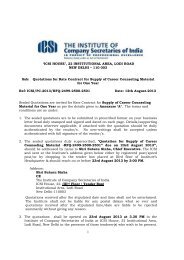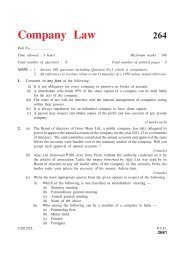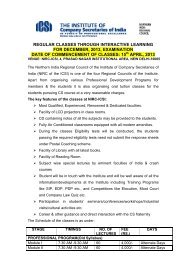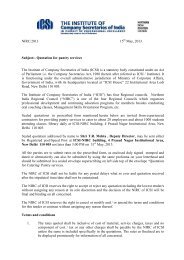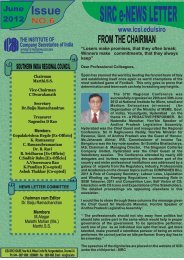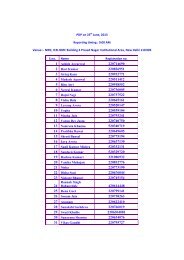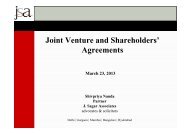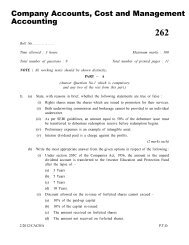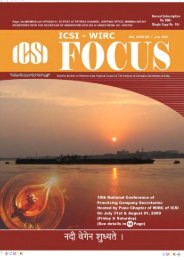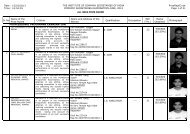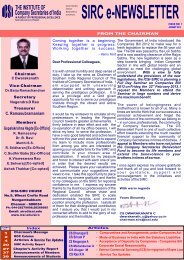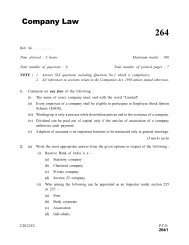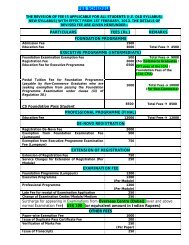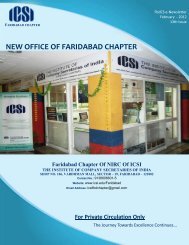WHISTLE BLOWING & PROFESSIONAL RESPONSIBILITIES*IntroductionIn every organization, one of the ethical dilemmasfaced by employees is potential conflict betweenloyalty towards their employers, Contemporariesand professional standards versus a duty to protectfrom unethical behaviour. Such conflicts arise onlyoccasionally however they are not less challengingin ethical terms for the individuals involved. Thereis a gamut of potential responses by individual whohas the gaze at some misconduct going on withinthe organization. Such gamut involves internalprotest, active and passive resistance, internal as wellas external disclosure.“Whistle blowing” represents one form of protest.The concept of whistle blowing was first popularizedin United States. One of the first laws that protectedwhistleblowers was 1863 United States False ClaimsAct (revised in 1986), which tried to combat fraudby suppliers of the United States Govt. during CivilWar. The Act encourages whistle blowers bypromising them a percentage of money recoveredor damages won by the government and protectsthem from wrongful dismissal. In United States, ithas become a small growth industry with new laws,procedures, court cases and commentariesproliferating daily. The activity is spreading rapidlyto other countries most of which operate withdifferent constitutional and legal systems anddifferent political traditions and cultures.Whistle blowingThe term whistle blowing comes from the phrase“blow the whistle” which refers to whistle beingblown by a police officer or referee to indicate anactivity that is illegal or a foul. Whistle blowing isnew label generated by our increased awareness ofthe ethical conflicts encountered at work. Whistleblowers sound an alarm within organization inwhich they work; aiming to spotlight abuses thatthreaten the public interest. In other words, whistleblowing is the exposure made in public interest bypeople within or from outside organization, ofsignificant information on corruption and wrongdoing and that would not otherwise be available.CS Shikha Talreja, ACS, LLBshikha@pfcindia.comArticleA Whistle blower discloses such information whichevidences any of the following:• Violation of any law, rule or regulation;• Gross mismanagement;• Negligence causing substantial and specificdanger to public health andSafety;• Manipulation of company data/records;• Financial irregularities, including fraud, orsuspected fraud;• Wastage/misappropriation of companyfunds/assets;Whistle blowing encompasses situations wherewhistle blowers report misconduct on a fellowemployee or superior within the Company. Whilethe reporting of sensitive issues may be part of theindividual’s role within the organization, when theindividual finds it necessary to reveal such findingsto organizational members outside the normal chainof command, it is also considered whistle blowingthrough internal channels. In an Organisation, thesensitive information is generally available only toselected employee. Else it may happen that onlyselected employees have the understanding of theissues sensitive in nature. Whistle blowers whoreport misconduct on outside persons or entitiesare termed as external whistle blowers. In suchcases, whistle blowers go out of the organizationalhierarchy and make information available to publicor other external authorities viz. Lawyers, media,etc. to get a positive action. Some whistle blowersare not justified; it may be an outlet for the“incompetent, the paranoid” or those with personalgrudges. Violations of personal trust and privacyare a dangerous tool of oppression in sometotalitarian regimes, where people are encouragedor forced to turn in any one for alleged violations.Professional ResponsibilityIn common parlance professional responsibilitymeans legal and moral duty of a professional toapply his or her knowledge in ways that benefit hisor her client, and the wider society, without causing*The views expressed are personal views of the author and it should not be taken as views of the NIRC-ICSI.This Article is an award winning Article in the Research Paper Competition, 2011 organized by NIRC.<strong>March</strong>, <strong>2012</strong> 12 NIRC-ICSI Newsletter
Articleany injury to either. In an Organization, there isprofessional obligation upon the employees toreport situations which involves misconduct orsomething which may affect public interest. In suchsituations, there may arise conflicts in their mindwhether or not to report abuse or serious neglect.Firstly, decision has to be taken as to whetherdisclosure of abuse or neglect would be in the publicinterest. It becomes more complicated by the factthat who is responsible for abuse or neglect? Whatare the chances that disclosure would precipitatechanges for better? Secondly the employee shouldponder his responsibility he owes to colleagues andthe institution in which he works. While theprofessional ethics requires collegial loyalty, thecodes of ethics often stress responsibility to thepublic over and above duties to colleagues. Add tothe conflicts confronting individuals, the claim toself policing that many professions make andprofessional responsibility is at issue is still anotherway. The question is how to resolve the conflict ofprofessional responsibility towards outside worldand professional loyalty. The same conflicts ariseto some extent in all groups but professional groupsoften have special cohesion and claim special dignityand privileges. Given the indispensable servicesperformed in disclosing the misconduct, strongsupport to whistle blowers from persecution is oftenmerited.Persecution of Whistle blowersPersecution of whistle blowers has become seriousissue in many parts of World. Although steps aretaken to protect whistle blowers there have beenmany cases where punishment for whistle blowinghas occurred such as termination, suspension,demotion, mistreatment by employer. In India,everyone was shocked by the murder of SatyendraDubey and Shanmughan Manjunath in the year 2003and 2005 respectively for exposing corruption innational highway construction and sale of impuregasonline. The inherent risk involved in blowingwhistle is that once the identity of whistle bloweris revealed there are high chances of retaliation.Therefore it is imperative for looking at holisticsolutions and empowers the whistle blowers withregulations for protection of whistle blowers andprosecution of those involved in misconduct, illegaland wrongdoings in an organization.Empowerment of whistleblowers throughlegislationSeveral countries have already put in place laws toprotect whistleblowers or are in the process ofdoing so. However the level of protection and theway in which the law operates differs from countryto country. For instance, the US was one of theearliest to have the Whistle blower Protection Act,1989 while the UK has the Public Interest DisclosureAct of 1998. In India at present there is no law toprotect whistle blowers, though a bill was preparedin the year 2009 viz. Public Interest Disclosure(Protection of Informers) Bill, 2009. As per the Bill,any person can make a complaint of corruption ordisclosure to CVC against any Central Govt.employee or those working in institution under theaegis of Central Govt. The CVC, which would bedesignated as the competent authority forcomplaints, would have the powers of a civil court,including powers to summon anybody, order policeinvestigation and provide security to the whistleblower. However the proposed law does not dealwith corporate whistle blowers, though as per therecommendations of the Second AdministrativeReforms Commission, the scope of the proposed lawcould be encouraged to deal with corporate whistleblowers too.While the Government still has to bring outcomprehensive whistle blower policy, the marketregulator viz. Securities and Exchange Board of India(SEBI) amended Clause 49 in listing agreement byincluding non mandatory clause under the heading“Whistle Blower Policy” to the following effect:“The company may establish a mechanism for employeesto report to the management concerns about unethicalbehaviour, actual or suspected fraud or violation of thecompany’s code of conduct or ethics policy. Thismechanism could also provide for adequate safeguardsagainst victimization of employees who avail of themechanism and also provide for direct access to theChairman of the Audit committee in exceptional cases.Once established, the existence of the mechanism may beappropriately communicated within the organization.”There are number of companies which have indeedevolved a whistle blower policy. The Policyinvariable provides for the safeguards for whistleblowers by providing a clause therein to the effectthat harassment or victimisation of the complainantwill not be tolerated. The intent of such policy is tobring genuine and serious issues to the fore and toprovide employees a chance to raise concern in linewith the commitment of the Company for moral andlegal business conduct. In its endeavour to do so,through this policy the Company provides necessarysafeguard for protection of employees fromreprisals or victimization for blowing the whistle ingood faith. The following process is generallyadopted by such Companies to redress the issueraised by whistle blower:<strong>March</strong>, <strong>2012</strong> 13 NIRC-ICSI Newsletter



